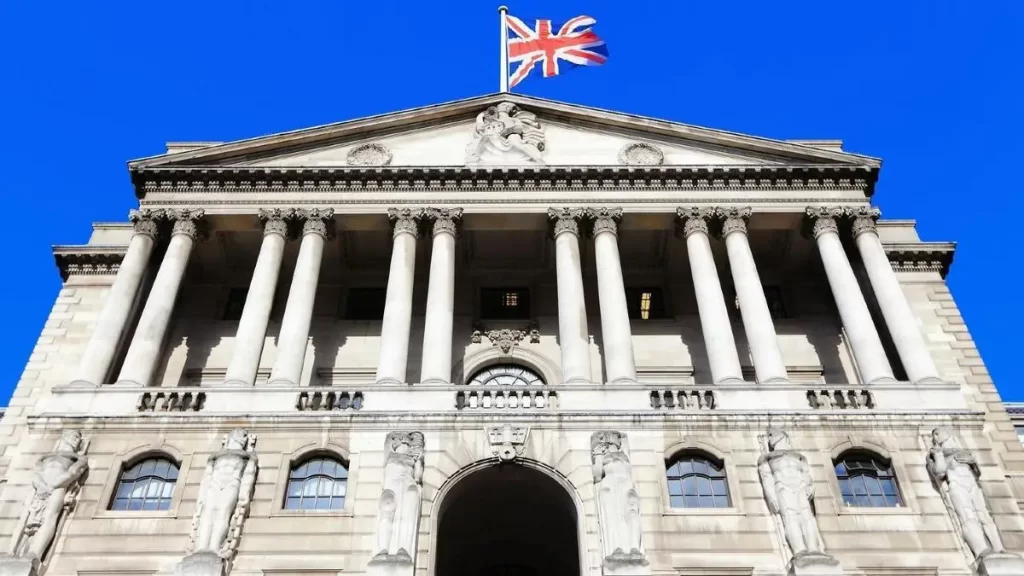(Reuters) – The Bank of England held interest rates at a 15-year peak on Thursday and said it did not expect to cut them any time soon as it fights to “squeeze out of the system” the highest inflation of the world’s big rich economies.
Despite new forecasts that showed the economy skirting a recession and then flat-lining, the BoE reinforced its message that borrowing costs would stay high, even though only about half the impact of its long run of rate hikes has yet been felt.
The Monetary Policy Committee (MPC) voted 6-3 to keep Bank Rate at 5.25% for the second meeting in a row after 14 back-to-back increases, as expected in a Reuters poll of economists.
“The MPC’s latest projections indicate that monetary policy is likely to need to be restrictive for an extended period of time,” the British central bank said, adding that it could still tighten again if inflationary pressures persisted.
In September, the BoE had said rates would need to remain “sufficiently restrictive for sufficiently long.”
Warning against complacency, Governor Andrew Bailey said inflation was still too high and that the BoE was determined to get inflation all the way back to its 2% target.
He also sought to hammer home the message that inflation’s fall and the weaker economic outlook did not mean rate cuts might soon be on the table.
“We will be watching closely to see if further increases in interest rates are needed,” he told reporters. “But even if they are not needed, it is much too early to be thinking about rate cuts.”
British government bond yields were nevertheless set for their biggest fall in months, as investors looked at the gloomy economic picture painted by the BoE and decided that its next move in rates was likely to be lower. The pound briefly rose.
The BoE will keep monetary policy restrictive only for long enough to “squeeze inflation out of the system”, Bailey said.
The European Central Bank and the U.S. Federal Reserve have similarly decided to keep rates on hold in recent days as they wait to see if their strong dose of rate hike medicine will curb the world’s worst outbreak of inflation in decades.
“The BoE has struck a similar tone to the Fed, and today’s 6-3 result shows that caution is spreading to central banks outside the U.S.,” Chris Beauchamp, chief market analyst at IG Group in London, said.
“While it’s still clear that rate cuts are off the table for the foreseeable, it seems the bar for another rate hike has been raised a little today.”
Bailey acknowledged that the conflict in the Middle East created a risk of higher energy prices that could feed through into inflation, but said that had not happened so far.
MPC members Megan Greene, Jonathan Haskel and Catherine Mann voted to raise rates to 5.5%. Sarah Breeden voted to keep rates on hold at her first meeting since replacing Jon Cunliffe.
FLAT-LINING ECONOMY
The BoE has said it is determined to stamp out the risk of a damaging spiral of higher pay and prices.
Although inflation has fallen from 11.1% – its highest since the 1980s – just over a year ago to 6.7% in the most recent data, it remains more than three times the BoE’s 2% target.
The central bank said it expected no growth in Britain’s economy in July-September, edging up to just 0.1% in the fourth quarter, with zero growth forecast for 2024 and an expansion of just 0.25% in 2025.
Even so, inflation would only return to 2% at the end of 2025, roughly six months later than previously forecast.
Markets continued to bet that the BoE would keep interest rates on hold until at least August next year, when it would probably start to cut them. The BoE showed no sign that it was challenging those expectations in its forecasts.
The BoE said the inflation rate was likely to drop to 4.8% in October, almost two full points lower than in September, as the impact of last year’s gas price surge fades.
It is still keeping a close eye on strong wage growth, however, which it fears could keep price pressures simmering.
The central bank said there were “increasing uncertainties” about official labour market data, which has been hampered by low survey response rates, but jobs growth was likely to have been weaker than it previously thought. It also expected worryingly strong growth in wages would cool off.
One detail in the BoE’s otherwise downbeat assessment of the economy is likely to be welcomed by Prime Minister Rishi Sunak.
It predicted inflation of 4.6% in the fourth quarter of 2023, which would mean Sunak meets his pledge to voters to have price growth this year, ahead of an election expected in 2024.



